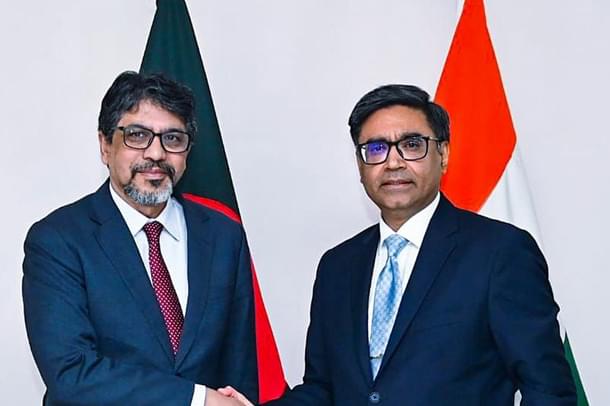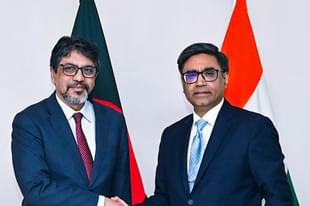World
India Delivers Blunt Message To Bangladesh On Attacks On Religious Minorities And Institutions
Jaideep Mazumdar
Dec 09, 2024, 07:35 PM | Updated 07:35 PM IST
Save & read from anywhere!
Bookmark stories for easy access on any device or the Swarajya app.


Indian Foreign Secretary Vikram Misri, who went to Dhaka Monday (December 9) morning on a one-day visit to the country, delivered a blunt message to his Bangladeshi counterpart Mohammad Jashim Uddin.
After landing at the Hazrat Shah Jalal International Airport in Dhaka in an Indian Air Force (IAF) jet, Misri held a one-on-one meeting with the Bangladesh foreign secretary before their respective delegations joined the talks.
According to sources in India’s Ministry of External Affairs (MEA), it was at the one-on-one with Jashim Uddin that Misri raised the issue of attacks on religious minorities and religious institutions like the ISKCON.
Misri said that India is naturally concerned about these attacks and Indians are agitated over what is widely perceived as the persecution of Hindus in Bangladesh.
Jashim Uddin said that reports of many such attacks are exaggerated and after the fall of the Sheikh Hasina government, angry mobs attacked Awami League leaders, functionaries and supporters, many of whom were Hindus.
But Misri showed his Bangladeshi counterpart irrefutable evidence of the communal nature of these attacks. He pointed out that attacks on ISKCON and Hindu religious figures who have nothing to do with the Awami League shows that the attacks are communal, and not political, in nature.
The Indian foreign secretary held out a veiled warning to Dhaka as well: he said that just as the attacks on religious minorities in Bangladesh has triggered anger in India, there is also growing disquiet in many other countries over such attacks.
If Bangladesh wants to maintain its prestige and standing in the comity of nations, it should ensure that the attacks on Hindus and Hindu religious institutions should stop.
Misri’s reference was to concerns raised in the UK and USA over attacks on religious minorities in Bangladesh. Those have caused deep discomfiture and embarrassment to the interim government headed by Mohammad Yunus.
The Indian foreign secretary also pointed to irresponsible anti-Indian speeches being made by leaders of some political parties, religious leaders and even some holding important positions in the interim government and said that those statements do not help in promoting bilateral ties.
Jashim Uddin raised the issue of the attack on the Bangladesh Assistant High Commission in Agartala last week. That attack, said the Bangladesh foreign secretary, had generated widespread anger in Bangladesh.
Misri, while acknowledging that the Agartala incident was regrettable and unfortunate, said that India had already expressed its regret and assured Bangladesh that there will be no repeat of such incidents. Security at all Bangladeshi missions in India have been tightened and made foolproof.
It is learnt that the Bangladesh foreign secretary assured Misri that the Yunus government is committed to protecting the minorities and safeguarding their interests. A number of steps, he added, has been initiated by the government and Mohammad Yunus personally to ensure complete protection to minorities.
Jashim Uddin then wanted to discuss other bilateral issues like river water-sharing, trade and transit agreements. But Misri said that while such issues are important, there should exist a conducive environment to discuss them.
Only after attacks on religious minorities, their places of worship and religious institutions stop can progress be made on other bilateral issues, Misri told his Bangladeshi counterpart.
This stand taken by India is similar to the one taken with China; India had repeatedly told Beijing that only after outstanding border issues are resolved can progress be made on other issues.
The delegation-level talks between the two sides were held in a cordial atmosphere. It is learnt that general discussions were held on bilateral trade, Indian investments in Bangladesh, the issue of river water sharing and on existing transit agreements between the two countries. The two sides decided to step up bilateral engagement and work on these issues.
Misri also underlined the need for intensifying people-to-people ties in order to improve relations between the two countries. People-to-people ties, he said, is the best way to deepen bilateral ties between the two countries and remove misunderstandings while also promoting a better understanding of each other’s perspectives and concerns.
Misri also met the country’s foreign affairs advisor (the de facto foreign minister) Mohammad Touhid Hossain. In that brief meeting, too, Misri voiced India’s deep concerns over attacks on religious minorities in Bangladesh.
The Indian foreign secretary told Hossain that India desires to develop a constructive and mutually beneficial relationship with Bangladesh and said that India is committed to help Bangladesh achieve its goals.
Misri, while addressing reporters in Dhaka late Monday afternoon, said: “We also discussed some regrettable incidents of attacks on cultural, religious and diplomatic properties. We expect overall a constructive approach on all these issues by the Bangladesh authorities and we look forward to moving the relationship forward in a positive, forward-looking and constructive direction”.
“I emphasized that India desires a positive, constructive and mutually beneficial relationship with Bangladesh. We have always seen in the past, and we continue to see in the future, this relationship as a people centric and people-oriented relationship, one that has the benefit of all the people as its central motivational force,” said Misri.
The Bangladesh side, it is learnt, was left feeling very uncomfortable with Misri highlighting the attacks on Hindus and Hindu religious institutions and figures, as well as the anti-Indian rhetoric in Bangladesh, during his talks with Jashim Uddin and his interaction with Hossain.
Bangladesh wanted to discuss other issues like river water sharing, trade and transit that it considered more important. But with the Indian side focusing on attacks on Hindus in Bangladesh, there was little scope for any substantial discussions on these issues.
The visit of the Indian foreign secretary to Bangladesh, top MEA officers told Swarajya, served the purpose of delivering an unequivocal message to the leadership of that country.
“The message was that attacks on Hindus and other religious minorities, and on Hindu religious figures and institutions, was completely unacceptable. And till this is resolved, there can be no progress in other areas,” said a senior MEA officer.
It was also made clear to Bangladesh, though very subtly, that India will rally other countries, especially the USA and other nations, to bring pressure on Dhaka to stop attacks on religious minorities.
“We have been conveying our concerns through normal diplomatic channels. But the foreign secretary going to Dhaka to personally deliver the blunt message on the need to stop attacks on religious minorities is of immense significance,” the MEA officer added.




